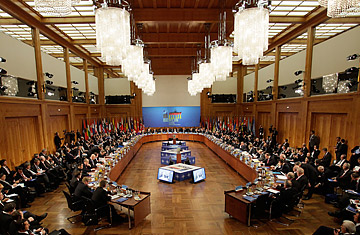
An informal meeting of NATO member foreign ministers together with the non-NATO ISAF members on April 14, 2011 in Berlin, Germany. The principal focus of the two-day meeting is the alliances military involvement in the war in Libya.
While NATO foreign ministers ended their meeting in Berlin on Friday with a show of unity in the military campaign against Libya, the two-day summit had exposed further cracks in the alliance — and now questions are being asked about whether NATO's air strikes are being ramped up from protecting civilians to all-out regime change.
Russia, which isn't involved in the campaign, is particularly wary of any signs of mission creep and reiterated its calls for a political solution to the Libyan conflict."We believe it is important to transfer the situation into the political field and proceed with a political and diplomatic settlement," Russian Foreign Minister Sergei Lavrov told a news conference in Berlin on Friday. "The UN has not authorized regime change," he added pointedly, warning the alliance not to use excessive force.
But NATO's Secretary General, Anders Fogh Rasmussen, was quick to hit back at Russian claims that the Libyan mission would exceed the UN mandate to protect civilians from Colonel Muammar Gaddafi. Rasmussen insisted that NATO's forces were acting "in strict conformity with both the spirit and the letter of the UN Security Council motion," which authorized a no-fly zone and gave member states the green light to "take all necessary measures" to protect civilians.
And to ram home the message that Gaddafi faces a formidable alliance, three of NATO's big-hitters — President Barack Obama, French President Nicolas Sarkozy and British Prime Minister David Cameron demanded that Gaddafi step down, saying they were "united on what needs to happen" to end the crisis in Libya. In a joint article published on Friday in The Times of London, France's Le Figaro and The Washington Post, they pledged that NATO would protect civilians: "So long as Gaddafi is in power, NATO must maintain its operations so that civilians remain protected and the pressure on the regime builds." The three leaders bluntly said a future for Libya with Gaddafi in power was "impossible." "It is unthinkable that someone who has tried to massacre his own people can play a part in their future government," they wrote.
Up until now, Britain and France have spearheaded the air campaign in Libya, which has degenerated into a military stalemate on the ground. Fourteen of NATO's 28 members are taking part in the mission, and only six are involved in direct air strikes. With the U.S. keen to scale back its military effort in Libya, Britain and France have put pressure on other member states to "step up to the plate." NATO Secretary General Rasmussen told reporters on Friday that he was confident that other countries would provide more ground attack aircraft for precision bombing raids. "We have got indications that nations will deliver what is needed ... I'm hopeful that we will get the necessary assets in the very near future," he said, though didn't reveal which countries had committed to new deployments.
In Rome, Silvio Berlusconi's government rebuffed French and British requests to take part in bombing missions over Libya. "We go on as we have done until now," said Italian Defense Minister Ignazio La Russa after a cabinet meeting on Friday, adding that Italy would not participate in ground attacks. (Britain and France use Italian airbases).
Some analysts say the divisions in the alliance have been exaggerated."While the legitimacy of this humanitarian intervention is unchallenged, many important questions about its feasibility remain — these are healthy disagreements," says Constanze Stelzenmüller, a Senior Transatlantic Fellow at the German Marshall Fund of the United States in Berlin. "It's also important to note that the coalition and then NATO acted despite these disagreements — and did so much faster than in previous cases [Bosnia, Kosovo, Afghanistan]."
Meanwhile, Germany has come under fire for abstaining on the UN's March 17 vote to enforce a no-fly zone over Libya, for fear of being sucked into a war in North Africa. Despite its refusal to join the military mission, Berlin has recently said it is ready to take part in a potential E.U. mission to secure humanitarian aid destined for Libya. "There has been a lot of confusion in the decision-making process in Germany's coalition government," says Volker Perthes, director of the German Institute for International and Security Affairs, noting that Germany's abstention has strained bilateral relations between Paris and Berlin.
On Thursday, NATO's foreign ministers agreed to three conditions which have to be met before they would end air strikes on Gaddafi's forces: the end of all attacks against civilians, a complete withdrawal of all the government's forces to their bases, and humanitarian access for all Libyan people. And for the alliance, there is still a strong case to be made for humanitarian intervention.
Secretary of State Hillary Clinton said on Friday that the Libyan campaign had prevented a massacre like the one in the Bosnian city of Srebrenica, when in 1995 Bosnian Serb forces killed more than 7,000 Muslims. "The world did not wait for another Srebrenica in a place called Benghazi," Clinton said at a memorial service for Richard Holbrooke, the late U.S. diplomat who brokered an end to the war in Bosnia. "Instead, we came together in the United Nations to impose sanctions, a no-fly zone and an arms embargo and protecting civilians...In a single week, we prevented a potential massacre, stopped an advancing army and expanded the coalition."
However, Clinton also warned that "we all need to be a bit patient," acknowledging that the military campaign will take time to achieve its goals. With the shadow of the war in Afghanistan looming, the alliance can only hope that it's not in for another long, drawn-out conflict.
